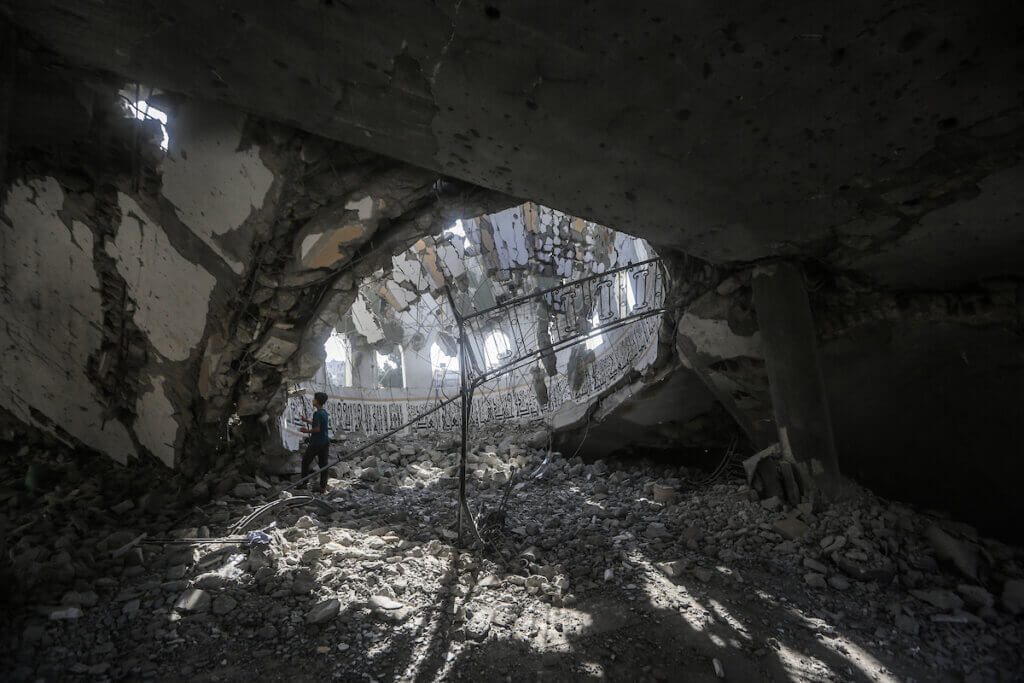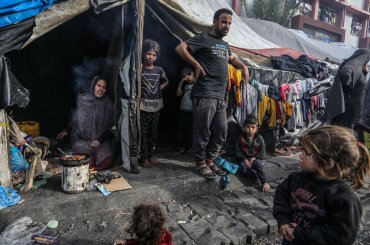During the day, the entire family devotes itself to one objective: finding food and water. In southern Gaza, looking for such things might as well be compared to mining gold.
A few weeks ago, families used to complain about the incredibly long lines at bakeries — a 6 to 8-hour wait to get a small bag of bread. Now, as bakeries close their doors due to the absence of flour and fuel, many are resorting to making bread at home, using seemingly impossible means. Parents send their children to scavenge for discarded plastic, cardboard, or anything that could be burned to light a fire — these are the lucky families who have been able to get their hands on some flour.
By nightfall, everyone is back in their shelters or their homes and talking war. Their conversations usually revolve around death, and sometimes the scale of the destruction.
Yesterday, as I sat in the front yard of the house where my family and I were staying, we heard a piercing whistle right before a bomb dropped on an area nearby us. A young man, startled by the sound, asked me whether we would have enough time to run away if the bomb were to be launched in our direction. Another young man interjected: “When the bomb falls on us, we won’t be able to hear a thing. It will kill us before we’re even able to think of running.”
The conversations move on. War talk brings us to tallying the deaths of people we know. Someone asks after a person, wanting to check in on them. The answer is abrupt: “he was killed.” Someone else asks about a family in a neighborhood that saw heavy bombing. The answer: “they were stuck under the rubble for hours, and no one survived.” The same conversation repeats itself. We start wagering on who among us might survive.
During these gatherings, we hear strange stories we can hardly believe are real. One woman who fled from the north tells us the story of her 29-year-old son, Issam Ileywa, who is married with three children and sells drinking water. She says he didn’t want to go south because he wanted to keep providing water to those who needed it in northern Gaza City. He sent away his wife and children but stayed behind.
Issam would drive through destroyed neighborhoods looking for people who were cut off and couldn’t access water, and would also make drop-offs at hospitals he passed by on his way. Even though circumstances like these are ripe for monopolists who can exploit the situation and raise prices, there are also heroes who emerge during these times. Issam didn’t take any money for the water, but he would accept donations to fuel his car and keep it running.
His mother told us that they lost contact with Issam for four days and that she asked many people from their area in al-Nasr who were able to flee south whether they had seen him. On the fifth day, a man gave Issam’s mother the news about her son. He had been sleeping in his car after their apartment building in al-Nasr was leveled during the beginning of the ground invasion of northwestern Gaza, and consequently, the car was bombed while Issam was sleeping in it. His body was completely charred when they transported him to the hospital.
The war stories continue. The deluge of human suffering is so numerous and so vast that it might take us a lifetime documenting and recounting it to the world.
Another woman named Mariam Qannu’ tells us she has a son who was unable to flee south with them from Gaza City, and that she was determined to make her way back to find him, dead or alive. Mariam tells us she was able to reach the north during specific hours when the occupation allowed for limited passage (usually in the other direction). When she reached the neighborhood where their home was located, she told us she couldn’t keep standing from the sight before her. Bodies were strewn across the streets and the sidewalks, and crows were gorging on their flesh as they decomposed. Her son was among them. She was only able to identify him from the pair of pants he always wore and his distinctive leather belt.
She says the bodies had unusual markings and signs of gnawing, as crows picked on them by day and stray animals converged on them by night when no one was in the area. These are the areas where the ground invasion has closed in, the same areas the ambulances can no longer reach, and where people’s bodies have been left to rot.
Mariam tells us she wrapped her son’s body in a blanket and carried it for over a kilometer on foot until she was able to find someone leading one of the animal-drawn carriages that had become common ever since fuel ran out. She was able to take her son’s body south, where she buried him.
The war stories often recount the horrific, and now they’re also interspersed with the surreal. Long lines for bread and water are no longer remarkable now that there are waiting lists for who gets rescued from under the rubble and whose decomposing body gets to be unearthed. Days ago, my friend and colleague Hani Abu Rizeq posted on Instagram recounting the story of a family who was buried under the rubble from an Israeli airstrike. The family’s neighbors called the Civil Defense, pleading for them to come rescue the family. The reply of the Civil Defense was that there was a waiting list of destroyed homes with other families buried underneath them, and they would have to wait their turn.
It wasn’t callousness, but a helpless statement of reality. There are thousands of families trapped under the rubble, waiting for their turn to be rescued.
Everything that was once living is dying. Everything that is beautiful in Gaza is now disfigured — its buildings, its landmarks, its earth, and its people. But the reality and the scale of the genocide are far worse than what is reaching the world. My journalist colleagues are now trapped wherever they were stationed before the beginning of the ground invasion. Most are in the south in hospitals and shelters, and they aren’t able to document what is happening in the warscape beyond. Only the few still stationed in stranded communities are able to comprehend a fraction of what is happening.
But beyond the stories that are being buried under the rubble that we aren’t able to reach, there are those stories that we don’t yet have the words to describe. People who think they’ve survived the war so far but can barely recognize themselves. People whose bodies remain intact but who have nothing to remind them that they’re alive.



Tareq … God only knows how much the Palestinian people have suffered and endured over the past 75 years from apartheid Israel’s barbaric massacres and oppression.
Silence is NOT an option for the Palestinian people & those who support human rights and freedom for all.
“People who think they’ve survived the war so far but can barely recognize themselves. People whose bodies remain intact but who have nothing to remind them that they’re alive.”
Eloquently expressed, Tareq.
Inna lilahi wa Inna illahi rajioon (From God we come, and to God we return).
May Allah protect you, Tareq! May God grant all of those killed the highest level of paradise and may He end the suffering of everyone who survives them. God help the people of Gaza!